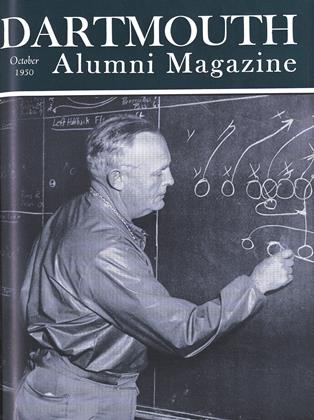THIS month I want to write briefly about a few books that I have enjoyed reading this summer one of the best summers I have ever known. Cool weather, and a beautiful world (scenically, I hasten to say) to observe.
While visiting in Westchester County this summer I found myself fascinated by Robert Gathorne Hardy's book: Recollections of Logan Pearsall Smith (Constable, London). I have long been a Smith fan having on my shelves his volumes of Trivia, Reperusals and Re-Collections, OnReading Shakespeare, Afterthoughts, unforgotten Years, and others. I had visualized him as a lean and hungry looking man, a tall scholar with white hair, browsing in the British Museum and the Bodleian. How wrong I was you may find out by reading this curious story of an expatriate American, a snob, a stylist, and "spoiled old man," who ended his life in so tragic a state. However, he was witty, if malicious; he loved the King's English with a passion; and he enriched in a small way English letters. Highly recommended to any and all who enjoy the vagaries of human nature.
Elephant Bill, by Lt. Col. H. J. Williams, published by Rupert Hart Davis in London where it was the Book Society's non-fiction choice, and here by Doubleday, where it was my choice, is the tale of a remarkable man who had a way with elephants. Elephant Bill spent more than go years in the Burmese jungle living with elephants and their riders, and working with them in the vast teak forests of that jungle land. There is humor, gentleless, knowledge, and thrills galore to delight the reader. When the Japanese overran Burma, Williams became "Elephant Adviser" to the British XIV Army, and when the Japs advanced on India he brought out a great number of elephants over precipitous mountain trails and through pathless jungle in a feat which may well have surpassed Hannibal's crossing of the Alps. This book is almost sure to interest you whether you like elephants or not. I am not especially an elephantophile, but I could scarcely put down the book.
Admiral Lord Mountevan's book TheDesolate Antarctic (London) may serve as an antidote to Admiral Byrd's view of Antarctica as a "Sermon in Ice." This book covers in a pleasing, if superficial, fashion the history of Antarctic explora- tion, its whales, seals, and penguins, its ice, blizzards, and calms. He gives credit to Sir Douglas Mawson where credit is long overdue and ends with a brief description of Byrd's "Operation High Jump" which made such a magnificent film called The Secret Land.
Maine, like skiing, is not a state or a sport, but a way of life. For those who know and love the state I can safely recommend, I think, Henry Beston's admirable anthology in the City and Country Reader Series published by Farrar Straus called White Pine and Blue Water. There are 62 selections ranging in time from Sir Fernando Gorges' description of Maine in 1622 to a story called "The Corduroy Pants" by Erskine Caldwell.
Vladimir Peniakoff's book Private Army (Cape) is unquestionably one of the most important and most interesting war books to come out of England since World War 11. "Popski," for such was Peniakoff's nickname, actually commanded a private army which raised havoc with the enemy in North Africa and Italy. This will be new to most Americans, but in England "Popski" was almost as legendary a hero as Lawrence of Arabia was in World War I.
 View Full Issue
View Full Issue
More From This Issue
-
 Sports
SportsFINIS
October 1950 By Bernard G. Sykes '51 -
 Article
ArticleMan on the Job . . . for Thirty Years
October 1950 By JOHN HURD '21 -
 Class Notes
Class Notes1918
October 1950 By ERNEST H. EARLEY, DONALD L. BARR, DAVID L. GARRATT -
 Class Notes
Class Notes1923
October 1950 By TRUMAN T. METZEL, COLIN C. STEWART 3RD, JULIUS A. RIPPEL -
 Class Notes
Class Notes1905
October 1950 By GEORGE W. PUTNAM, GILBERT H. FALL -
 Article
ArticleTHERE'S METHOD Behind the Fall Madness
October 1950 By ROGER K. WOLBARST '43
Article
-
 Article
ArticleTri-Kap Centennial
August 1942 -
 Article
ArticleFellowships for Eleven
November 1951 -
 Article
ArticleThe Compleat Home Engineer
OCTOBER 1967 -
 Article
ArticleTHE COLLEGE
November 1953 By C. E. W. -
 Article
ArticleSERIOUS CONCERN BELOW SURFACE
November 1940 By Charles Bolte '41 -
 Article
ArticlePrinceton Wins, 33-0
December 1952 By Cliff Jordan '45

